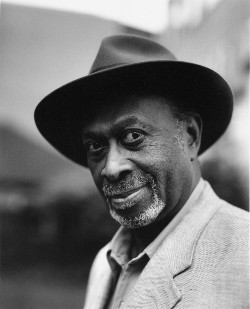James Berry (poet) facts for kids
Quick facts for kids
James Berry
|
|
|---|---|

James Berry by Sal Idriss
|
|
| Born | 28 September 1924 |
| Died | 20 June 2017 (aged 92) |
| Occupation | Poet |
|
Notable work
|
Bluefoot Traveller (1976) News for Babylon (1984) |
James Berry, who received the OBE award, was a famous Jamaican poet. He was born on September 28, 1924, and passed away on June 20, 2017. He moved to England in the 1940s. His poems are special because they mix regular English with Jamaican Patois, which is a unique way of speaking in Jamaica.
Berry's writing often looked at how black and white communities got along. He also wrote about the exciting and sometimes difficult experiences of Caribbean people who moved to Britain from the 1940s onwards. He helped many West Indian and British writers get noticed by editing important poetry books like Bluefoot Traveller (1976) and News for Babylon (1984).
Contents
Life and Work of James Berry
James Berry was born and grew up in the countryside of Portland, Jamaica. His father was a small farmer, and his mother was a seamstress. He started writing stories and poems when he was still in school.
Moving to the United States and Britain
During World War II, when he was a teenager, James Berry worked in the United States for six years (1942–1948). He said that America needed farm workers, and he and his friends were excited for a new chance. However, they soon learned about the "colour problem" in the United States. This meant there was a lot of unfair treatment and discrimination against black people, which was different from what they knew in the Caribbean.
After returning to Jamaica, he felt stuck. When the famous ship Windrush came along, it offered a way to move to Britain. James Berry couldn't get on the Windrush, but he sailed to Great Britain on the second ship, the SS Orbita, in 1948.
Life in London and Early Writing
James Berry settled in London in 1948. He went to night school and worked as a telegrapher, sending messages. At the same time, he kept writing. He loved London because it had many books and libraries he could easily use.
He became an early member of the Caribbean Artists Movement, which started in 1966. This group helped Caribbean artists and writers in Britain. In 1976, Berry put together the book Bluefoot Traveller, which was a collection of poems. His first own poetry book, Fractured Circles, came out in 1979.
Achievements and Later Works
In 1981, James Berry won the Poetry Society's National Poetry Competition. He was the first poet of West Indian background to win this award. He also edited another very important book called News for Babylon (1984). This book was special because a major publisher, Chatto & Windus, published it.
Berry wrote many books especially for young readers. Some of these include A Thief in the Village and Other Stories (1987), The Girls and Yanga Marshall (1987), and Anancy-Spiderman (1988). His book A Story About Afiya (2020) was even named one of the best children's books by the New York Times.
His last poetry book, A Story I Am In: Selected Poems, was published in 2011. It included poems from five of his earlier collections. In 1995, a play based on his poem "Song of a Blue Foot Man" was performed at the Watford Palace Theatre.
Recognition and Legacy
In 1990, James Berry was given the title of Officer of the Order of the British Empire (OBE) for his contributions to poetry. In 2004, he was one of fifty Black and Asian writers featured in a famous photograph called "A Great Day in London" at the British Library. The British Library also keeps his writings and papers, including parts of a novel he never published.
James Berry passed away in London on June 20, 2017, after dealing with Alzheimer's disease.
Awards and Honors
- 1977–78, C. Day-Lewis Fellowship
- 1981, National Poetry Competition (for "Fantasy of an African Boy")
- 1987, Smarties Prize (for A Thief in the Village)
- 1989, Signal Poetry Award (for When I Dance)
- 1989, Coretta Scott King Book Award
- 1991, Cholmondeley Award
- 1993, Boston Globe-Horn Book Award (for Ajeemah and His Son)
- 2007, Honorary Fellow of the Royal Society of Literature
See also
 In Spanish: James Berry para niños
In Spanish: James Berry para niños
 | Georgia Louise Harris Brown |
 | Julian Abele |
 | Norma Merrick Sklarek |
 | William Sidney Pittman |

